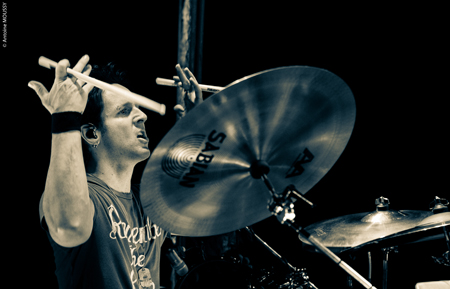
Drummer for the stars Glen Sobel has been the backbone behind the Alice Cooper band since 2011. Whether it be hard rock, fusion or drum n bass, Glen has it covered. He’s a ridiculously nice dude and he graciously took the time out of his crazy busy day before a clinic at Cranbourne Music in Melbourne Australia to have a chat to me. I even interrupted his dinner! Told you he was a great bloke. Check out the interview video below.
CLINIC INTERVIEW
Backstage before the gig!
CLINIC PERFORMANCES
Open Drum Solo
‘Fast or Never’
‘Elephant Stomp’
SKYPE INTERVIEW
As printed in Mixdown Magazine (Australia) – extended version
I’d chatted to Glen via Skype in the days leading up to his visit to Australia while he was in Los Angeles. Here’s what he had to say about preparing for a big tour, the importance of varied styles and what challenges him.
AV: You’ve spoken about the importance of awareness, appreciation and the study of different styles of music, even though you play a lot of Rock. Can you elaborate?
GS: Yeah, I play a lot of Rock but I’ve listened to so many other bands and artists – the styles are related. If you work on your Jazz chops and independence and listen to a lot of the great players – whether it be the traditional swing guys or the fusion guys, it’s gonna add to your Rock and Funk playing. They’re all related. Billy Cobham played a double bass drum ‘galloping’ shuffle back in ‘73 on his solo album but that was clearly something coming from a Jazz style; playing the jazz ride pattern etc. Later on, Alex Van Halen adapted that for a lot of Van Halen songs including Hot For Teacher but it all came from Jazz and goes way back. So, the more styles you learn the better you’re going to be. Why would you not want to improve on your instrument?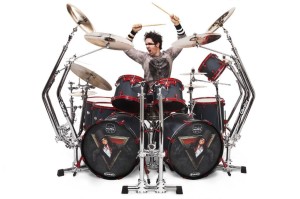
AV: Absolutely. What challenges you these days?
GS: Well, sometimes you have to learn a lot of material in a short amount of time. You do tend to develop a skill for this as well but it does happen. However, this is what I’d call a good problem. It can be a challenge but it also makes you step up to plate and you might do better than if you only had one thing to do.
AV: So I suppose that ties in with how you might prepare for a big tour? When you got the Alice Cooper gig, you would have had a lot of back catalogue to learn? Did you just lock yourself away for three weeks?
GS: When I first got on the Alice Cooper gig in the spring of 2011, I had a list of 35 songs but that was way ahead of time so it wasn’t so bad. They weren’t going to play 35 songs in the set but there was a lot they would choose from so you learned everything. I was taking my ipod to the gym and of course making my cheat sheets, listening in the car – had plenty of time on that.
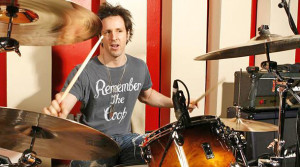 Really, the biggest tour where I had the least amount of time to learn songs was the Vasco Rossi tour in 2010. That was an amazing time. I was actually doing a cover gig at this tiny sports bar in Los Angeles and I met a producer who I ended up doing one recording session for. I thought I mustn’t have done a good job because I never heard from him again – turns out he used a lot of programmed drums. Like, a year later, he calls me and asks if I can get on a plane to Italy in three days to tour with Vasco Rossi? I’d heard a little bit about Vasco as he’d used a few American drummers like Kenny Aronoff and Jonathan Moffett, plus Gregg Bissonette and Vinnie Colaiuta on his records – I knew he was big but didn’t know he was that big. I had to learn 26 songs in three days and I had a gig the day before I left – it was one of those things – you better get to work. It helps to read music in these cases. I didn’t transcribe everything but I was making cheat sheets that gave me cues. It’s a system I understand. It was a pressure situation because it was stadiums and arenas of like 40,000 people. Promoters and the band wanna know it’s going to be ok. I was the last call for the gig too so my plan was to absolutely nail it in the first rehearsal. Not about chops, just playing the songs the way they’re used to hearing and feeling it and to make it feel like the usual guy is there. After the first two songs (that were a medley) they were clapping and relieved. From then on, it was fun.
Really, the biggest tour where I had the least amount of time to learn songs was the Vasco Rossi tour in 2010. That was an amazing time. I was actually doing a cover gig at this tiny sports bar in Los Angeles and I met a producer who I ended up doing one recording session for. I thought I mustn’t have done a good job because I never heard from him again – turns out he used a lot of programmed drums. Like, a year later, he calls me and asks if I can get on a plane to Italy in three days to tour with Vasco Rossi? I’d heard a little bit about Vasco as he’d used a few American drummers like Kenny Aronoff and Jonathan Moffett, plus Gregg Bissonette and Vinnie Colaiuta on his records – I knew he was big but didn’t know he was that big. I had to learn 26 songs in three days and I had a gig the day before I left – it was one of those things – you better get to work. It helps to read music in these cases. I didn’t transcribe everything but I was making cheat sheets that gave me cues. It’s a system I understand. It was a pressure situation because it was stadiums and arenas of like 40,000 people. Promoters and the band wanna know it’s going to be ok. I was the last call for the gig too so my plan was to absolutely nail it in the first rehearsal. Not about chops, just playing the songs the way they’re used to hearing and feeling it and to make it feel like the usual guy is there. After the first two songs (that were a medley) they were clapping and relieved. From then on, it was fun.
AV: Do you play any different on the really big gigs? Is there room for subtlety or is it pretty much full throttle the whole time?
GS: You do have to think in more broad strokes for these kind of gigs. If there’s a breakdown and your doing doubles on the hi-hats, it’ll probably come through. It does depend on your sound guy too, but those gigs are definitely a differently animal compared to a smaller type gig such as The Baked Potato here in town, which was kinda like going to school – so many great players were there over the years – but I played there recently and a kid and his father who saw an Alice Cooper show remarked on how different it is with my stick heights for example. But that was improvisational fusion music – 180 degrees from the other shows, but you need to be that diverse and be able to play with those types of dynamics so it’ll open you up to more types work possibilities. I enjoy mixing it up like that.
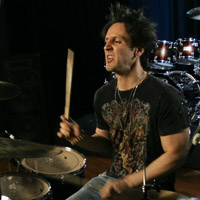 AV: Can you give some advice on how to practice the harder fills (linear etc) in order to rip them out when you want to? When it matters?
AV: Can you give some advice on how to practice the harder fills (linear etc) in order to rip them out when you want to? When it matters?
GS: Well, you can’t really go into a gig with that sort of agenda. It can’t be stuff that’s forced. I tell myself this stuff all the time you know, I’m not perfect, I have to tell myself to relax and be natural. That might happen more when you’re in a more improvisational situation but on any gig, you have to play stuff you don’t have to think about.
Which means, when you’re in your practice room, when it is time to think, you need to play whatever it is you’re working on – whether it’s a beat, pattern, a linear thing, crazy double bass thing – whatever it is, you have to play and practice it over and over and over until you’re sick of it! Then, you gotta practice it some more. There’s no magic pill and no special teacher you can go to that’s all of a sudden gonna show you some secret to make you awesome overnight. It takes time.
Practice to a metronome and put the idea into some sort of hypothetical musical situation or context. You play time, then the fill and go back to time. It’s always good to have even numbers too. If you’re doing a fill, maybe do four bar phrases, placing the fill on bar 4. Or do one bar time and one bar fill. At least you’re getting used to coming out of the fill and hitting that crash on one. It’s all about it becoming second nature.
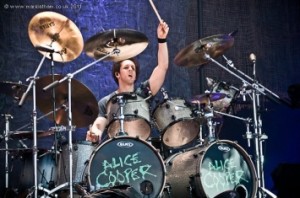 Maybe it’s a beat or some Latin pattern, where it’s all about independence? You’d wanna practice it at a variety of tempos with your metronome, hopefully play it with a band or records or something but you play the pattern, play fills and come back to the pattern. You don’t own it yet. You want to be able to own it. I see a lot of drummers – they’re learning stuff by listening only to records – it is very important obviously – you do want to listen and have influences but there’s no real foundation behind it. They might play something cool from a record but they don’t actually know what they’re doing. They may not realise that the groove they’re doing is based on a double paradiddle. It would help if they were well versed in their paradiddles etc – the basics of drumming – it’s the language. It’s kinda like an American band goes to country like Japan and the crowds are all singing along in English but they can’t have a conversation in English – they don’t know what they’re saying. It can be the same with drumming often. People are sorta just playing what they hear but they haven’t had any formal education – they don’t know what a double paradiddle is. With a solid foundation, you can really learn something and really do something with it by changing it and adapting it. Reading music helps so you know how to approach moving the idea into triplets or something!
Maybe it’s a beat or some Latin pattern, where it’s all about independence? You’d wanna practice it at a variety of tempos with your metronome, hopefully play it with a band or records or something but you play the pattern, play fills and come back to the pattern. You don’t own it yet. You want to be able to own it. I see a lot of drummers – they’re learning stuff by listening only to records – it is very important obviously – you do want to listen and have influences but there’s no real foundation behind it. They might play something cool from a record but they don’t actually know what they’re doing. They may not realise that the groove they’re doing is based on a double paradiddle. It would help if they were well versed in their paradiddles etc – the basics of drumming – it’s the language. It’s kinda like an American band goes to country like Japan and the crowds are all singing along in English but they can’t have a conversation in English – they don’t know what they’re saying. It can be the same with drumming often. People are sorta just playing what they hear but they haven’t had any formal education – they don’t know what a double paradiddle is. With a solid foundation, you can really learn something and really do something with it by changing it and adapting it. Reading music helps so you know how to approach moving the idea into triplets or something!
Can you see I think about this stuff a lot? (laughs)
AV: I think it’s fantastic you’re so passionate about this stuff. Just lastly, do you still teach? Do you enjoy it?
GS: Yeah, I have this practice space out here in L.A. that I share with Dean Butterworth from Good Charlotte as he lives close by. He goes in during the morning to practice and I do later in the day. So, yeah I do some lessons in that room. Not a lot these days but some. I did a stack of lessons at the musician’s institute in Hollywood, which was awesome. I do enjoy it.
Check out more about GLEN SOBEL – GlenSobel.com
Glen Sobel proudly endorses:
SABIAN Cymbals | MAPEX Drums | REGAL TIP Drumsticks | DW Hardware | REMO Drum Heads

Leave a reply